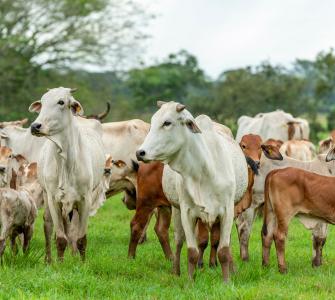In the highlands of Panama, livestock production—primarily beef—plays a central role in the rural economy. However, this industry is both carbon-intensive and environmentally harmful, contributing significantly to deforestation and biodiversity loss through extensive cattle ranching practices.
To address these challenges, Ponterra, in partnership with Verra, is implementing an Afforestation, Reforestation, and Revegetation (ARR) project aimed at restoring degraded habitats, protecting biodiversity, and enhancing climate resilience by creating natural carbon sinks. A key issue for such initiatives is the risk of carbon leakage—where emissions reductions in one area are offset by increased emissions elsewhere, undermining the project’s climate impact.
Conservation Strategy Fund (CSF) supported this initiative by conducting a robust economic analysis to assess and mitigate the risk of carbon leakage from the livestock sector in this region of Panama. The project began with CSF’s hypothesis that as the market for Panama’s livestock shrinks, so has the associated risk of carbon leakage. CSF set out to test this assumption using rigorous technical and economic methods.
CSF developed a national econometric model of livestock activity in Panama, focusing on key indicators of production trends, market dynamics, and land use. To ensure the model’s relevance to the ARR project, we validated the national-level results with local data, complemented by stakeholder interviews and on-the-ground surveys in the project region.
Key areas of analysis included:
- The structure and trends of the livestock sector in Panama, including production systems, dominant species, and economic drivers;
- The environmental impacts of livestock activity, particularly links to deforestation and land degradation;
- The policy and regulatory landscape influencing land use and livestock production, and gaps that could influence the effectiveness of carbon interventions;
- A risk assessment framework for identifying potential leakage drivers and strategies for reducing that risk.
Based on our findings, CSF provided tailored recommendations and leakage mitigation strategies to strengthen the ARR project’s integrity and long-term sustainability. This work contributes to the broader body of methodologies for evaluating and addressing leakage risk in ARR and REDD+ programs in order to facilitate the long-term sustainability of these initiatives.
Through this collaboration, CSF is advancing the use of economic tools to support climate and conservation goals, helping ensure that nature-based solutions deliver real and lasting impact.
Read the full report from CSF here, and look through our key insights presentation here.
__
Photo: Herd of young brahman cattle in a field in Panama
Photo Credit: Alfredo Maiquez, Shutterstock

